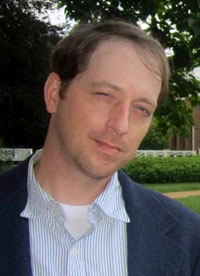Michael Hattem earned a B.A. in History through the CUNY Baccalaureate for Unique and Interdisciplinary Studies (CUNY BA) program, with BMCC and then City College of New York (CCNY/CUNY) as his home schools. He then entered the doctoral program in American history at Yale University, focusing on eighteenth-century political culture and the American Revolution and winning almost a dozen historical research fellowships from entities including the Historical Society of Pennsylvania, the Massachusetts Historical Society, the New-YorkHistorical Society and the Smith National Library at Mount Vernon. During the 2017-18 year, he will be a Bernard and Irene Schwartz Postdoctoral Fellow at The New-York Historical Society and the Eugene Lang College for Liberal Arts at The New School. Hattem co-founded the popular history blog, The Junto, and is a producer and co-creator of the history podcast, The JuntoCast. “Without BMCC having been there to give me my first opportunity, none of those things would have been possible,” says Hattem, who came to BMCC at age 31, relying on public assistance and what he describes as “menial” jobs. He credits the support he received as a BMCC Foundation Scholar and mentors at BMCC such as History Professor Jacob Kramer, for helping him take the first important steps on his scholarly and career paths.
Q: What is your favorite memory (professor, class, etc.) of BMCC?
A: As a freshman, I took both halves of the U.S. survey history course with Professor Jacob Kramer. In the second half, because of my interests and motivation, he let me do a genuine research project instead of the shorter papers the rest of the class did. That experience was crucial for me in confirming my love for historical research and my desire to pursue a Ph.D. in History. That experience shows the impact of faculty members at BMCC, particularly when they’re willing to take a chance on a student.
Q: How did BMCC help you get where you are today?
A: I enrolled in BMCC because I never graduatedfrom high school. I had received a GED back when I was 17 but between then and my early 30s I had mostly worked menial and temporary clerical jobs. Without a high school diploma or SAT scores, BMCC was one of the only CUNY schools that would admit me. BMCC gave me a chance when other schools would not, and, for that, I am eternally grateful. That said, my circumstances were not unique.Every year, BMCC opens its doors to a broad array of students looking to improve their lives through education, whether that is getting a certification to move forward in their careers, getting a degree to help start a new career, or even education as part of the acculturation process for its many immigrant students. In doing so, BMCC changes not only the lives of its students but also makes New York City a better place. Now, seven years after leaving BMCC, I am set to receive my PhD in History from Yale University in the spring of 2017 and am currently pursuing academic job opportunities.
Q: What advice do you have for today’s BMCC students?
A: Don’t underestimate your potential! We’ve all seen BMCC’s advertisements on the subway that say, “Start Here. Go Anywhere,” and I am sure most people read that as a cliché. I can tell you from my own personal experience that it is not. After two years at BMCC, I transferred to CCNY where I completed my B.A. in History. From there, I wasaccepted into the Ph.D. program in History at Yale University. And I am not the only person to have started at BMCC and gone on to study at one of the country’s top universities. Even for those who want to pursue a non-academic career path, BMCC helps you clear that path. Where that path leads is up toyou, but students should know that if they have the potential and the drive to do something great, BMCC can help them get there. BMCC opens the door; it’s up to you to walk through it.
Q: Why is it important for alumni to stay involved with BMCC?
A: It is important for alumni to stay involved with BMCC for all the reasons stated above. BMCC is an important institution both within CUNY and the city itself. I have participated in and spoken at a number of events aimed at benefitting BMCC. To my mind, I will always be grateful for the opportunity BMCC gave me and I want to do everything I can to help the college give that same opportunity to as many students as want it, particularly those like me who come back to school later in life. If all of the college’s alumni contributed even in some small way to furthering the mission and reach of the college, BMCC can continue to be a place that is open and welcoming to anyone willing to work hard and improve their lives, no matter their age, their previous academic record, or their place of birth.


